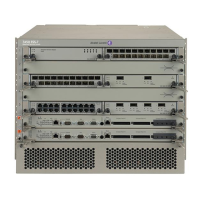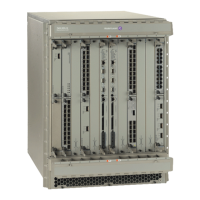Service Egress and Ingress QoS Policies
Quality of Service Guide 353
SAP and Subscriber SLA-Profile Average Frame Overhead Override — The average frame overhead
parameter on a sap-egress may be overridden on an individual egress queue basis. On each SAP and
within the sla-profile policy used by subscribers. An avg-frame-overhead command may be defined
under the queue-override context for each queue. When overridden, the queue instance will use its
local value for the average frame overhead instead of the sap-egress defined overhead.
The no form of this command restores the average frame overhead parameter for the queue to the
default value of 0 percent. When set to 0, the system uses the packet based queue statistics for
calculating port scheduler priority bandwidth allocation. If the no avg-frame-overhead command is
executed in a queue-override queue id context, the avg-frame-overhead setting for the queue within the
sap-egress QoS policy takes effect.
Default 0
Parameters percent — This parameter sets the average amount of packet-to-frame encapsulation overhead
expected for the queue. This value is not used by the system for egress Ethernet queues. This
parameter only applies to the 7450 ESS and 7750 SR.
Values 0.00 to 100.00
burst-limit
Syntax burst-limit {default | size [byte | kilobyte]}
no burst-limit
Context config>qos>sap-ingress>queue
config>qos>sap-egress>queue
Description The queue burst-limit command is used to define an explicit shaping burst size for a queue. The
configured size defines the shaping leaky bucket threshold level that indicates the maximum burst over
the queue’s shaping rate.
The burst-limit command is supported under the sap-ingress and sap-egress QoS policy queues. The
command is also supported under the ingress and egress queue-group-templates queues.
The no form of this command is used to restore the default burst limit to the specified queue. This is
equivalent to specifying burst-limit default within the QoS policies or queue group templates. When
specified within a queue-override queue context, any current burst limit override for the queue will be
removed and the queue’s burst limit will be controlled by its defining policy or template.
Parameters default — The default parameter is mutually exclusive to specifying an explicit size value. When
burst-limit default is executed, the queue is returned to the system default value.
